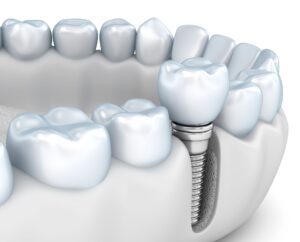Millions of people have missing teeth. Not only could this disrupt the look and function of your smile, but you could have a higher risk of oral health complications, including for your jawbone.
Implant dentistry is the best way to protect the health of your jaw in the wake of tooth loss. Removable dental solutions will not always stop damage to the jaw that missing teeth may cause. Read on to discover how tooth loss negatively affects your jaw and how dental implants can help you avoid this problem.

What Happens to Your Jaw When You Lose a Tooth?
A healthy dental patient has a full set of teeth, and each tooth extends to a root that goes below the gum line and reaches the jaw. The tooth root stimulates the bone in the jaw, keeping it strong.
When you lose one or more teeth, the jaw no longer receives stimulation because the tooth root is now missing. Without the root’s presence, the bone in the jaw will begin to deteriorate. This weakening in the jaw can result in the appearance of facial sagging and the shifting in the position of any remaining teeth.
You cannot stop this from occurring on your own. So to protect the structure of your jawbone, you will need targeted tooth replacement solutions.
How Do Dental Implants Preserve Your Jawbone?
A dental implant makes for the ideal tooth replacement to preserve jawbone health. It consists of a titanium post anchor, which a dentist surgically places into the jaw. The anchor fuses with the bone in the jaw to establish a solid foundation that will support your prosthetic teeth.
The anchor also serves as a replacement for the missing tooth root and provides stimulation to the jaw once again. This will prevent the bone from degenerating and may even encourage bone that was already lost to regrow in some cases. Then you can keep your facial and dental structure looking and feeling their best.
Removable tooth replacements like dentures can restore the look and function of your smile after tooth loss. But you will need more comprehensive treatment with dental implants to get this full protection.
Can Your Jaw Sustain a Dental Implant?
Though the benefits of implant dentistry are clear, not all patients can qualify for this tooth replacement. Dental implants require enough strong and healthy jawbone to allow the fusion of the anchor and bone to occur successfully. If too much bone has already been lost, you cannot sustain a dental implant.
A dentist will evaluate your jawbone health through x-ray imaging taken during a dental consultation. If they determine you do not have a stable enough jawbone, they may recommend a bone graft. This will add structure to the jaw that may ultimately support an implant.
If this solution is not feasible, you may need to pursue alternative restorative dental treatment. Your dentist will develop an individualized plan to restore your smile in the wake of tooth loss.
